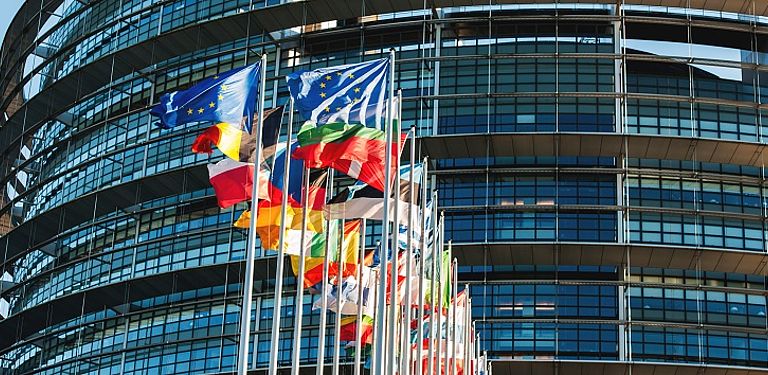Panel discussion on "EU Foreign Policy: Is There a Future for the Eastern Partnership": In the room (pictured from left to right): Florence Ertel, Dr Magda Arsenyan, Constanze Aka. In the zoom meeting: Mihai Mogildea and Marta Wytrykowska. Photo: Christina Engl
“The Russian war of aggression against Ukraine triggered new opportunities for the EU to strengthen its relations with countries in its Eastern Neighbourhood,” say Florence Ertel and Julian Plottka, Research Associates in the EUCON project at the University of Passau. “These governments would like to balance Russian influence through more intensive relations with the EU.” Dr Hannes Meissner, Project Coordinator of the EUCON Network at University of Applied Sciences BFI Vienna, is even convinced that we face global competition between autocracies and democracies, in which the EU has to engage. Dr Renke Deckarm, Acting Head of the Regional Representation of the European Commission in Munich, was confident that the next European Commission after the upcoming European elections in 2024 will build on the current Team Europe approach to foreign policy, of maximising the EU’s impact by joining forces of all member states, and give EU external relations an even higher profile.
To discuss how the EU can meet these demands and redesign the Eastern Dimension of its Neighbourhood Policy, the Eastern Partnership, the EUCON Round Table was organised by the Jean Monnet Chair for European Politics at “the university, which does not carry Europe in its name – yet –, but in its heart,” according Dr Deckarm. The event is part of the EU-funded Jean Monnet Network “The EU and the EEU: Between Conflict and Competition, Convergence and Cooperation” (EUCON). More than 50 participants joined the debate either at the International House in Passau or online from across Europe.
Jean Monnet network EUCON: Between Conflict and Competition, Convergence and Cooperation
Researchers at the University of Passau are taking part in the Jean Monnet network EUCON. Five universities from the EU and the Eurasian Economic Union will be analysing relations between their two regions in the next three years.
Returning to her alma mater as a panellist for the EUCON Round Table, Constanze Aka, Researcher in East European Studies from Berlin, who has intensively worked with Ukrainian civil society, described how the Russian war of aggression against Ukraine changed the Ukrainian civil society’s view of the EaP. Before 2022, civil society was sceptical as progress towards the desired EU accession was slow. Since Ukraine became candidate for EU membership parts of the civil society see chances to revitalise the EaP, if it develops a strong security dimension, covering military, internal, and cyber security alike. Others remain sceptical, fearing that the EaP will remain incapable of addressing current challenges.
Reporting from Moldova, Mihai Mogildea, Deputy Director of the Institute for European Policies and Reforms (IPRE) in Chișinău, also found security to be the top priority for a future EaP. Especially investments in Moldovan defence capabilities are needed. As the economic and financial support provided by the EU is of crucial importance to the country, a smooth transition from the European Neighbourhood Policy to enlargement policy is a key concern in the country.
For Dr Magda Arsenyan, Managing Editor of the Journal of Political Science: Bulletin of Yerevan University at the Yerevan State University, security is also key to the future relations between Armenian and the EU. Armenians expect from the EU to act as a security provider in its neighbourhood. While appreciating that the President of the European Council, Charles Michel, is engaged as a moderator in the conflict between Armenia and Azerbaijan, Dr Arsenyan criticised that the EU is biased towards the Azerbaijani position, not fully acknowledging Armenian national interest.
“The Eastern Partnership is a victim of its own success.” Because EU association under the EaP worked well, Moldova and Ukraine a now candidate countries, found Marta Wytrykowska, Deputy Head of Division for the Eastern Partnership, European External Action Service, who tuned in via Zoom from Brussels. Currently, the EaP is not static, but in a process of adaptation to changing expectations of its partners. Two civil CSDP missions in Armenia and Moldova show the EU’s responsiveness.
Bringing together different perspectives from partner countries, future EU member states, and EU institutions in Passau, was the added value of the EUCON Round Table. Like the host of the evening, Florence Ertel, Director of the Science Hub for Europe and Research Associate at the Jean Monnet Chair for European Politics at the University of Passau, stimulated a dialogue between the diverse actors invited to the EUCON Round Table, the EU should apply an inclusive approach to develop the future design of the EaP together with its partner countries. Prof Dr Christina Hansen, Vice President for International Affairs, Europe and Diversity of the University of Passau, reminded the participants of the importance of also considering different views from within each society.
In research, such an inclusive approach is the specific feature of the EUCON Network, presented by Dr Meissner. It offers researchers from Armenia, Austria, Germany, and Hungary the opportunity to conduct common analyses, combining their different views from inside the EU and the Eurasian Economic Union. Vice President Prof Dr Hansen underlined that supporting such transdisciplinary and trans-societal approaches to research and strengthening the cooperation with academic partners is a priority of the University of Passau.
Professor Christina Hansen
How do layout and re-figuration processes work in (educational) spaces?
How do layout and re-figuration processes work in (educational) spaces?
Professor Christina Hansen holds the Chair of Education (Primary) with a focus on diversity at the University of Passau. Since August 2020, she has been the Vice-President for International Affairs, Europe and Diversity.






![[Translate to English:] [Translate to English:]](https://www.digital.uni-passau.de/fileadmin/_processed_/e/e/csm_2022Europa-Flaggen_Ukraine_Goeler_5756091d97.png)